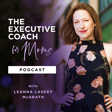
Sustaining Strong: How Strength Training Empowers Women with Self Confidence, Resilience, and Mental Wellbeing - with Sarah Brelowski (part 2)
In Part 2 of Leanna’s conversation with certified personal trainer, consultant, and mom Sarah Brelowski, they dive into the transformative power of strength training for women, especially women over 40. Sarah’s goal is clear: to help women feel empowered, confident, and strong in the gym and in life.
Sarah breaks down the science and mindset behind strength training, and why it's especially important for women navigating busy lives, hormonal changes, and shifting definitions of health. From lifting heavy to prevent bone loss, to building functional strength that makes everyday life easier, Sarah makes a compelling case that the weight room isn’t just for bodybuilders, it’s for all of us.
More than a conversation about fitness, this episode is about empowering women and moms to take up space, prioritize their health, and reframe strength as a tool for lifelong resilience.
If you missed Part 1, be sure to catch Sarah’s inspiring career journey and how she redefined success on her path to personal and professional fulfillment in episode 107.
Full transcript available here.
Connect with Leanna here.
If you're ready for deeper transformation, check out The Executive Mom Reset; Leanna’s six-month coaching program designed to help ambitious moms stop merely surviving and start thriving. Book a consult now!
Don’t forget to subscribe, rate, and review the show to help more women find these empowering stories!

